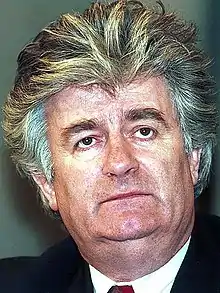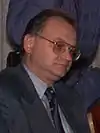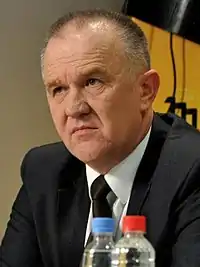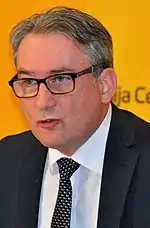Serb Democratic Party (Bosnia and Herzegovina)
The Serb Democratic Party (Serbian: Српска демократска странка/Srpska demokratska stranka or СДС/SDS) is a Serb political party in Bosnia and Herzegovina. Its current leader is Mirko Šarović.
Serb Democratic Party Српска демократска странка Srpska demokratska stranka | |
|---|---|
.svg.png.webp) | |
| Leader | Mirko Šarović |
| Founder | Radovan Karadžić |
| Founded | 12 July 1990 |
| Headquarters | Pale, Istočno Sarajevo |
| Ideology | |
| Political position | Right-wing[2][3] |
| HoR BiH | 2 / 42
|
| HoP BiH | 1 / 15
|
| NA RS | 13 / 83
|
| Website | |
| www | |
In the parliamentary elections of October 2006, the SDS lost its status as the leading party in Republika Srpska and the main Serb party in Bosnia and Herzegovina to the Alliance of Independent Social Democrats (SNSD), led by the Prime Minister of Republika Srpska Milorad Dodik.[4] Despite making minor gains in the 2010 and 2014 elections, by 2018 the party had fallen to below 20% of the parliament, the lowest seat standing in its history. The Serb Democratic Party is under sanctions from the United States for "failing to arrest and turn over war crimes suspects to an international tribunal." The sanctions prohibit any transfer of funds and material from the United States to the SDS and vice versa.[5][6] The party is on the list of Specially Designated Nationals and Blocked Persons by the Office of Foreign Assets Control U.S. agency.[7]
History
Establishment
Radovan Karadžić founded the Serb Democratic Party in 1990. The party aimed at unifying the Bosnian Serb community, as Jovan Rašković's Serb Democratic Party did with the Serbs in Croatia, and staying part of Yugoslavia (as the "Third Yugoslavia" with Serbia and Montenegro) in the event of secession by those two republics from the federation.[8]
1991
Throughout September 1991, the SDS began to establish various "Serb Autonomous Regions" throughout Bosnia and Herzegovina. After the Bosnian parliament voted on sovereignty on 15 October 1991, a separate Serb Assembly was founded on 24 October 1991 in Banja Luka, in order to exclusively represent the Serbs in Bosnia and Herzegovina. The following month, Bosnian Serbs held a referendum which resulted in an overwhelming vote in favor of staying in a federal state with Serbia and Montenegro, as part of Yugoslavia. In December 1991, a top-secret document entitled ‘For the organization and activity of organs of the Serbs people in Bosnia-Herzegovina in extraordinary circumstances’ was drawn up by the SDS leadership. This was a centralized program for the takeover of each municipality in the country, through the creation of shadow governments and para-governmental structures through various "crisis headquarters", and by preparing loyal Serbs for the takeover in co-ordination with the Yugoslav People's Army (JNA).[9]
Ideology
Historically, the party had strong Serbian nationalist,[1] separatist[1] and Islamophobic ideology. Recently, the party switched from far-right and adopted more modest right-wing national-conservative views, with some of those views even going in favor of Bosnia and Herzegovina as a whole, and not just the Republic of Srpska. Perhaps one of the greatest promoters of that approach is Dragan Mektić, one of the party's high-ranking officials.
List of presidents
| No. | Portrait | Name (Born-Died) | Took office | Left office | Time in office |
|---|---|---|---|---|---|
| 1 | Radovan Karadžić (born 1945) | 12 July 1990 | 19 July 1996 | 6 years, 7 days | |
| 2 | Aleksa Buha (born 1939) | 19 July 1996 | 1 July 1998 | 1 year, 347 days | |
| 3 | Dragan Kalinić (born 1948) | 1 July 1998 | 3 July 2004 | 6 years, 2 days | |
| 4 | Dragan Čavić (born 1958) | 3 July 2004 | 15 December 2006 | 2 years, 165 days | |
| 5 | Mladen Bosić (born 1961) | 15 December 2006 | 8 October 2016 | 9 years, 298 days | |
| 6 | Vukota Govedarica (born 1976) | 14 October 2016 | 30 June 2019 | 2 years, 259 days | |
| 7 | Mirko Šarović (born 1956) | 30 June 2019 | Incumbent | 1 year, 223 days |
Electoral results
Parliamentary elections
| Year | Popular vote | % of popular vote | # of seats | Seat change | Coalition | Government |
|---|---|---|---|---|---|---|
| 1996 | 568.980 | 52.3% | 45 / 83 |
N/A | — | government |
| 1997 | Unknown | 28.9% | 24 / 83 |
— | opposition | |
| 1998 | 160.594 | 21.7% | 19 / 83 |
— | opposition | |
| 2000 | 226.226 | 36.1% | 31 / 83 |
— | government | |
| 2002 | 159.164 | 31.2% | 26 / 83 |
— | government | |
| 2006 | 103.035 | 18.27% | 17 / 83 |
— | opposition | |
| 2010 | 120.136 | 18.97% | 18 / 83 |
— | opposition | |
| 2014 | 173.824 | 26.26% | 21 / 83 |
SRS RS | opposition | |
| 2018 | 123.515 | 18,04% | 16 / 83 |
SRS RS | opposition |
Presidential elections
| Election year | # | Candidate | Votes | % | Note | Elected? |
|---|---|---|---|---|---|---|
| 1996 | Momčilo Krajišnik | 690,646 | 67.3% | — | Yes | |
| 1998 | Momčilo Krajišnik | 314,236 | 44.7% | — | No | |
| 2002 | Mirko Šarović | 180,212 | 35.5% | — | Yes | |
| 2006 | Mladen Bosić | 130,824 | 24.2% | — | No | |
| 2010 | Mladen Ivanić | 285,951 | 47.31% | Support | No | |
| 2014 | Mladen Ivanić | 318,196 | 48.71% | Support | Yes | |
| 2018 | Mladen Ivanić | 292,065 | 42.74% | Support | No |
| Election year | # | Candidate | Votes | % | Note | Elected? |
|---|---|---|---|---|---|---|
| 1996 | Biljana Plavšić | 636.654 | 59.2% | — | Yes | |
| 1998 | Nikola Poplašen | 322,684 | 43.9% | Support | Yes | |
| 2000 | Mirko Šarović | 313,572 | 49.8% | — | Yes | |
| 2002 | Dragan Čavić | 183,121 | 35.9% | — | Yes | |
| 2006 | Dragan Čavić | 163,041 | 29.4% | — | No | |
| 2007 | Ognjen Tadić | 142,898 | 33.8% | — | No | |
| 2010 | Ognjen Tadić | 227,239 | 35.92% | — | No | |
| 2014 | Ognjen Tadić | 296,021 | 44.28% | — | No | |
| 2018 | Vukota Govedarica | 284,140 | 41.81% | — | No |
Positions held
Major positions held by Serb Democratic Party members:
| Member of the Presidency of Bosnia and Herzegovina | Years |
|---|---|
| Momčilo Krajišnik | 1996–1998 |
| Mirko Šarović | 2002–2003 |
| Borislav Paravac | 2003–2006 |
| Chairman of the Council of Ministers of Bosnia and Herzegovina | Years |
| Boro Bosić | 1997–1999 |
| Spasoje Tuševljak | 2000 |
| President of Republika Srpska | Years |
| Radovan Karadžić | 1992–1996 |
| Biljana Plavšić | 1996–1998 |
| Mirko Šarović | 2000–2002 |
| Dragan Čavić | 2002–2006 |
| Prime Minister of Republika Srpska | Years |
| Branko Đerić | 1992–1993 |
| Vladimir Lukić | 1993–1994 |
| Dušan Kozić | 1994–1995 |
| Rajko Kasagić | 1995–1996 |
| Gojko Kličković | 1996–1998 |
| Pero Bukejlović | 2005–2006 |
| President of Republika Srpska National Assembly | Years |
| Momčilo Krajišnik | 1992–1996 |
| Dragan Kalinić | 1996–1998 2000–2004 |
| Dušan Stojičić | 2004–2006 |
References
- Nordsieck, Wolfram (2018). "Bosnia–Herzegovina". Parties and Elections in Europe. Retrieved 11 October 2018.
- Nardelli, Alberto; Dzidic, Denis; Jukic, Elvira (8 October 2014). "Bosnia and Herzegovina: the world's most complicated system of government?". The Guardian. Retrieved 11 October 2018.
- Arnautović, Suad (2018). "The Presidentialisation of Political Parties in Bosnia and Herzegovina: A Mitigated Presidentialism". In Passarelli, Gianluca (ed.). The Presidentialisation of Political Parties in the Western Balkans. Palgrave Macmillan. p. 87. ISBN 978-3-319-97352-4.
- Eralp, Doğa U. (2012). Politics of the European Union in Bosnia-Herzegovina: Between Conflict and Democracy. Lexington Books. p. 21. ISBN 978-0-7391-4945-4.CS1 maint: ref=harv (link)
- Archived 22 July 2012 at the Wayback Machine
- "US Places Sanctions on Bosnian Serb Officials". L.A. Times. Associated Press. Archived from the original on 26 October 2015. Retrieved 27 November 2015.
State Department spokesman Richard Boucher said that, under the sanctions, any assets the Serbian Democratic Party had in the United States would be frozen. In addition, he said, any members of that party or its partner, the Party for Democratic Progress, would be banned from entering the United States.
- "Office of Foreign Assets Control black list" (PDF). Office of Foreign Assets Control. Retrieved 12 February 2016.
- "Raškovićeva SDS obnovljena u Beogradu" (in Serbian). Vesti online. 5 March 2011. Retrieved 21 August 2018.
- Gow, James (2003). The Serbian Project and Its Adversaries: A Strategy of War Crimes. Montreal: McGill-Queen's University Press. pp. 122–123. ISBN 1850654999.





.jpg.webp)